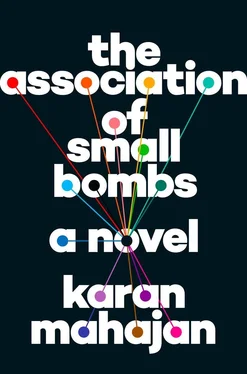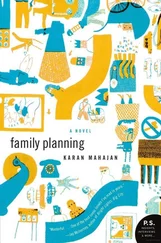Somehow Vikas and Deepa were holding hands again.
It was in this state — making physical contact — that they were best. He had never lost his fascination, never once in fifteen years (they had been married as long as his chacha had not been a cabinet secretary, he realized, with some satisfaction), for how light her bones were; his hands clawed through hers as if trying to break a spider’s web. She opened up her hand and then clung to his tightly. If I had known it would come to this, he thought, I would never have married her. I would have let her go the very first minute we became acquainted at Arthur Andersen; I would have dived behind a desk as she passed.
The lady was the deputy head of the jail system. Now looking tougher to Vikas in her stiff uniform and military posture, she was telling them about protocol, the various things they could and could not do. He nodded, taking in nothing. Then, suddenly, there were too many bodies in the room — not just Mukesh and Jagdish and his wife and the escort but three or four assistants, men dressed like backup waiters at a restaurant or snack servers at a wedding — and the whole group was now led into what appeared to be a barbershop, a vast, sparse space with polished mirrors on one side and chairs that reclined.
“This is run by our inmates,” she said. “They charge twenty rupees for a haircut. The idea is to give them vocational training so when they go out they can adjust to the world.”
“I made a documentary about jails,” Vikas said. “I saw this in the Arthur Road Jail addition in Bombay.”
“Yes, yes, they have it there also,” she said. “But it started here.” She considered Vikas coldly now, with the suspicious look of someone quite unused to having her authority defied. “So you make films, is it?”
“Documentaries, mostly.”
“He’s won two National Film Awards,” Jagdish said. “You must watch them. About social issues,” he muttered. (Vikas had won two Film Society awards, a lesser honor, but he did not interrupt).
But the woman’s attention, in the vast modern-looking white barbershop, had been snared. “A woman came here a while ago, a Mrs. Sujata Menon — you know her?”
“Ah, of course; she’s a friend of mine,” Vikas said, trying to ingratiate himself and also to be a little curt — he did not think this was a pertinent conversation to have seconds before a major meeting; it reminded him of the way surgeons bantered with excessive, rehearsed politeness before they plunged scalpels into you in the ICU. “She took a lot of footage and talked to a lot of my boys here,” the woman said — this is how she referred to her inmates: as boys. “After that I never heard from her. Can you please tell her Mrs. Thapar was asking about her?”
“Of course.”
“A very nice lady; I liked her,” she said. “She really understood the type of reform I’m trying to introduce here.”
Vikas smiled politely. He knew Sujata Menon well. She was a sharp and dangerous journalist — she was always gaining access to places with her upper-middle-class, convent-educated charm and then backstabbing her subjects. He was sure the documentary was about the horrors of these people who proposed “reforms.” Not that he was opposed to such a documentary — that’s what he’d been abortively working toward at Arthur Road Jail in Bombay — it was just that he didn’t approve of misleading people.
The warder of the jail now seemed smaller to him. She was the supreme leader of this domain, of her “boys,” but still wanted acclaim from the outside world; he realized that the server-like men were reformed prisoners. They took their place behind the barber seats. Two pathetic inmates, young malnourished boys, sat lost in the vast chairs before the mirrors. The waiters cut with teasing, pulling, staccato precision. A show for the Khuranas.
“Come,” she said, leading them to another room.
________
Malik had learned about the meeting that morning; he had not had much time to prepare. He thought he was meeting a journalist who wished to hear his side of the story, and he had scrambled in his cell to put together a coherent narrative. Something about Gandhi, yes. Gandhi, Kashmir. Being a student of chemistry. He flailed wildly for details about the other innocents who’d been arrested: artisan, student, summer holidays, framed.
For him too the walk through the chambers of the jail was a new thing — most prisoners did not get to see this part of the jail. It was for visitors only. He marveled at the clean lines, the symmetric tiles, the photos on the wall — how did one gain admission here? What minor crimes did you have to commit? Of course, he dared not ask the guards. Getting to meet a sympathetic journalist was enough luck for a day. He was led into a room with tinted plastic windows on all sides and given a cup of tea. It was like being in one of those opaque government waiting rooms, complete with cheap plastic fittings. He slurped the tea slowly, amazed, savoring every last syrupy sip. Then there was a commotion and a few people walked in. As soon as he saw them, their mishmash of clothes, the white salwar kameez the woman was wearing, he knew something was wrong. The couple looked vaguely familiar: Had they been at the trial? Malik, with his photographic recall, tried to think back through the haze of heat and hunger to the dusty room in which he had been charged with the crime. Beyond his feet, in that room of his memory, people and faces foamed, indistinct in their seats.
Then a man said (this was Mukesh), “Do you recognize them?” and Malik fell silent.
________
“He’s not saying anything,” Mukesh said, shouting for a guard.
Vikas and Deepa were locked in a tight mutual silent stare with Malik, seated across from him. He looked back dumbly, limply. Vikas observed the smallness and narrowness of his wrists, that tell of malnutrition. He reminded Vikas of nothing more than the young, eager Kashmiri boys who had rowed his shikara on Dal Lake on his one visit to the state before the violence broke out. And yet, if you looked closely, through Mukesh’s shouting, there was something guilty, even sullen, about his nonchalance and silence. Why choose to remain silent if you were innocent? Silence is the small man’s only defense. “Now be a good boy and answer their questions,” Jagdish said, going up to him and touching his shoulder. The man did not flinch. “It doesn’t look like he’s going to say anything.”
“Give him some time,” Vikas said. “We can also be quiet.”
“Don’t you people feel ashamed?” Mukesh said. “Oye, bhainchod.”
“Maybe you should go out,” Vikas said. He gestured at Deepa, who looked hurt and meditative. Mukesh went out.
Deepa too looked at the man. The gap between them was so small. Yet she didn’t know what she could say. Her head burst with the boys’ voices and gestures and shrill demands — somehow it was these demands and questions that stayed with her most. She saw the boys lying on their stomachs on the drawing room floor covering their school readers with plastic or brown paper. She saw them pausing in doorways, stretching. Smashing a sponge ball in their room with a tiny imitation cricket bat from a factory in Ludhiana. Making high-pitched sounds in imitation of their favorite cricket commentators. Nakul sitting on the sofa, with his brown thin arms, asking, “But what is a prostitute, Mama?” A teacher had called a girl with purple nail polish that. “And she called Madhur a gasbag!” he snorted, suddenly getting up at full tilt and going into his room, where, a few seconds later, you could hear a sponge ball tocked against the wall. Nakul’s Chinese-looking eyes. His darkness, his innocence, his Olympian cuddling, his monkeyish way of nearly hanging off the bed while he slept. Tushar’s perpetual mousy, frightened look. His habit of picking his nose, which irritated Vikas. “Where do you think he gets it from?” Deepa told him.
Читать дальше












